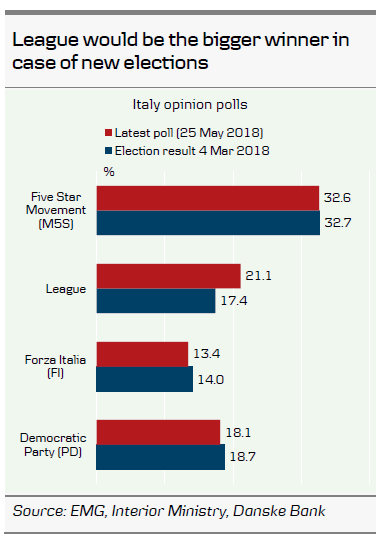Yesterday, the push to form a populist government derailed, after President Sergio Mattarella vetoed the Five Star/League choice of euro-sceptic finance minister Paolo Savona, citing concerns about threats to Italy’s euro membership and the savings of Italian families. Five Star and the League reacted furiously to the decision, accusing the President of being influenced by Moody’s decision on Friday to put Italy on negative watch.
The ball is now with the President again. He has indicated that he might take a few days to consider the request to dissolve parliament and call for new elections. At the time of writing, Mattarella has just given former IMF official Carlo Cottarelli the mandate to try to put together a ‘neutral’ interim government.
There is heightened uncertainty on what will happen next but we think current developments point to Italy heading to the polls again eventually. The President seems reluctant to call a vote before the 2019 budget is approved in October, preferring an interim government that would last until the end of this year and take the country to new elections in early 2019. However, given opposition from Five Star, the League and Forza Italia, such a technocratic government currently looks unlikely to pass a vote of confidence. This makes new elections in the autumn the more likely option in our view (9 September mentioned as a possible date by Italian media). This said, the power to dissolve parliament and thereby the timing of elections lies with the President (once parliament is dissolved, a vote has to happen within 70 days).
Following the standoff over the finance minister appointment, Five Star has also called for an impeachment of the President. At this stage, we view this as unlikely, as Five Star would need the support of the League as well, which has so far remained silent on the matter and it also risks paving the way for an additional institutional crisis, with a potential voter backlash.
Although the president’s move has created some short-term respite in the Italian turmoil, we see a strong possibility that populists will emerge from a new election even stronger (see chart), given the current momentum and mood. This means further market turbulence lies ahead, also because eurosceptic tones are likely to feature even more prominently in the next election campaign, especially from the League.
BTP rally has already petered out
This morning we saw an initial rally in the BTP market on the back of the failure to form a populist government. However, at the time of writing, 10-year Italian yields are once again edging higher. This underlines that the market is still concerned about the political outlook and that a caretaker government or new snap election would not be a silver bullet for solving the political impasse in Italy, especially as both 5SM and the League could benefit from the current situation and the political discussion might increasingly centre on the question of leaving the euro.
We stay on the sidelines with respect to BTP exposure despite the healthy carry on the Italian curve and the imminent lower risk of a populist government. This morning we took a stop/loss on our recommendation to buy 5Y BTP versus 2Y Schatz.
Moody’s could still go through with downgrade
Over the weekend, Moody’s put Italy on review for possible downgrade. This is very serious as Moody’s did this outside the normal rating calendar and it usually takes rating action outside the schedule only if it sees a material change in assumptions regarding the current rating and outlook. Furthermore, it is negative watch, which means it will take action within three to six months. However, Moody’s based its update on the programme of the ‘old’ government. However, if a possible new government continues down the same road, we believe it is likely Moody’s would go through with the downgrade.
Possibilities in Spain and Portugal
We have seen some contagion from Italy to Spain and Portugal. In respect of Spain, we see pressure on Prime Minister Mariano Rajoy. However, the political situation is in no way comparable to that in Italy. There is no specific reason why Portugal is spreading out. If we see some weeks of stabilisation, both Spain and Portugal could offer interesting opportunities for bond investors.

